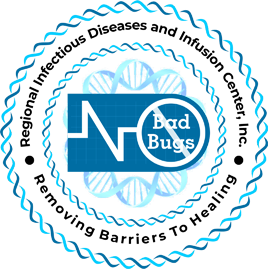
C. Difficile Infection: Can It Go Away On Its Own?
Clostridioides difficile is a bacterium that infiltrates and infects the large intestine (colon), often leading to symptoms ranging from diarrheal illness to life-threatening damage of the colon. Commonly referred to as C. difficile or C. diff, C. difficile infections may lead to devastating results affecting all parts of a person’s body if left untreated.
C. difficile infections typically arise following antibiotic medication use and are most prevalent among elderly hospital or long-term care facility residents.
Per the US Centers for Disease Control and Prevention (CDC), in the United States, it’s estimated to be responsible for nearly half a million infections, annually. A significant portion of patients, around one in six, who contract C. diff is likely to experience a recurrence within two to eight weeks. Alarmingly, of those individuals over 65 years old who are diagnosed with a healthcare-associated C. diff infection, one in eleven succumbs to the infection within a month.
Consultation with healthcare professionals for accurate diagnosis and management is strongly encouraged in these instances. Our infectious disease specialist at RID-IC can work with your current physician to develop a treatment plan best suited to your needs and ensure you are properly followed up. Under our care, we will check on your progress, confirm that the infection is treated, and help prevent it from reoccurring. Call us for a consultation at 706 – 739 – 7789
C Diff symptoms
C. diff infections can present a spectrum of symptoms, ranging from mild to severe. Some people carry C. difficile bacteria in their intestines without falling ill, serving as carriers who can potentially spread the infection to others. In milder cases, symptoms may include watery diarrhea occurring three to four times a day, accompanied by stomach pain, cramping, or tenderness. However, more serious infections may exhibit additional symptoms such as blood or pus in the stool. This occurs due to C. diff’s ability to cause inflammation in the colon, leading to bleeding and the formation of pus in colon tissues. Other indicators of a severe infection encompass diarrhea more than 10 times a day, severe cramping, fever, nausea, loss of appetite, weight loss, dehydration, and a rapid heart rate.
Signs and symptoms of a C. diff infection typically emerge within 5 to 10 days after commencing a course of antibiotics. However, they can also manifest as early as the first day or as late as three months later.
Mild to moderate infection:
In cases of mild to moderate C. diff infection, the following symptoms are commonly observed:
- Watery diarrhea occurring three or more times a day for more than one day
- Mild abdominal cramping and tenderness
Severe infection:
A severe C. diff infection can lead to dehydration and may require hospitalization. The bacterium can cause inflammation in the colon, leading to the formation of raw tissue patches that can bleed or produce pus. Symptoms indicating a severe infection include:
- Watery diarrhea occurring as often as 10 to 15 times a day
- Severe abdominal cramping and pain
- Rapid heart rate
- Dehydration
- Fever
- Nausea
- Increased white blood cell count
- Kidney failure
- Loss of appetite
- Swollen abdomen
- Weight loss
- Presence of blood or pus in the stool
In rare cases, a sudden and severe C. diff infection can cause intestinal inflammation, resulting in the enlargement of the colon (toxic megacolon) and sepsis. Sepsis is a life-threatening condition where the body’s response to infection harms its own tissues. Individuals experiencing these conditions require intensive care unit (ICU) admission.
Severe C. diff infections can result in pronounced intestinal inflammation, an enlarged colon, and an extreme response to an infection called sepsis. These conditions are severe and necessitate immediate medical attention, often leading to hospitalization.
If diarrhea caused by a C. diff infection becomes extremely severe, it is crucial to seek prompt medical assistance, as severe diarrhea can lead to life-threatening dehydration.
Causes and Risk Factors of Clostridium Difficile (C. diff) Infection
C. diff, a bacterium that can cause infection, is present in various environments such as the air, water, soil, and the feces of humans and animals.
When C. diff bacteria exist outside the body, they form spores that can remain viable on surfaces for extended periods, ranging from weeks to months. Although these spores are not actively harmful, they can become active once ingested and reach the intestines. While some individuals carry C. diff in their intestines without experiencing symptoms, others may be affected as the bacteria produce toxins that attack the intestines.
A newer strain of C. diff bacteria has emerged, producing larger amounts of toxins and proving challenging to treat with medications.
C. diff bacteria commonly spread within healthcare facilities, including hospitals and nursing homes, where there is a higher likelihood of contact between workers and patients or residents. Infection can also occur through touching contaminated clothing, sheets, or surfaces that have come into contact with feces and subsequently touching the mouth or nose.
Older adults residing in healthcare facilities face the highest risk, particularly when they are taking antibiotics. Antibiotics can disrupt the balance of bacteria in the body, eliminating both beneficial and harmful strains. If the antibiotics eliminate enough healthy bacteria, the C. diff bacteria can thrive unchecked and cause illness.
Certain antibiotics have been linked more closely to the risk of C. diff infection, including Cephalosporins, Clindamycin, Fluoroquinolones, and Penicillins
Moreover, there has been an increasing number of younger individuals contracting C. diff infections, even without antibiotic use or hospitalization. Failure to practice thorough hand hygiene after exposure to the bacteria can contribute to infection.
Additionally, certain factors increase the likelihood of acquiring C. diff:
- Having a condition such as colorectal cancer or inflammatory bowel disease
- A weakened immune system resulting from cancer treatment or another health issue
- Women have a higher susceptibility to C. diff compared to men
- Individuals aged 65 or older are at a higher risk
- Prior episodes of C. diff infection increase the chances of recurrence.
Can C. diff go away on its own?
Mild infections of Clostridium difficile (C. diff) may heal themselves over time without needing specific medical treatment, however, it’s important to be mindful that C. diff infections may recur and should never be left untreated as doing so can lead to further complications and prolonged symptoms.
C. diff infections are typically treated with antibiotics that specifically target this bacteria. Antibiotics like metronidazole, vancomycin, and fidaxomicin may be prescribed to combat C. diff infections and restore healthy intestinal bacteria balance.
C. diff infections require prompt medical care and appropriate treatments in order to avoid worsening of symptoms, reduce transmission risk and alleviate them more effectively.
Call a doctor if –
- You have a fever (increased body temperature).
- You have chills, a cough, or feel weak and achy.
- You have worsening diarrhea
- You have a hard time eating, drinking, or breathing.
- Your symptoms do not improve or are getting worse.
- You have questions or concerns about your condition, treatment, or care.
